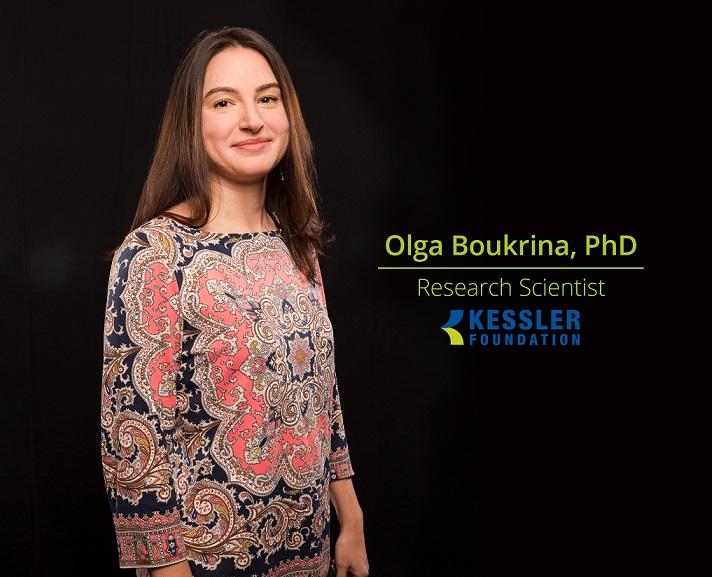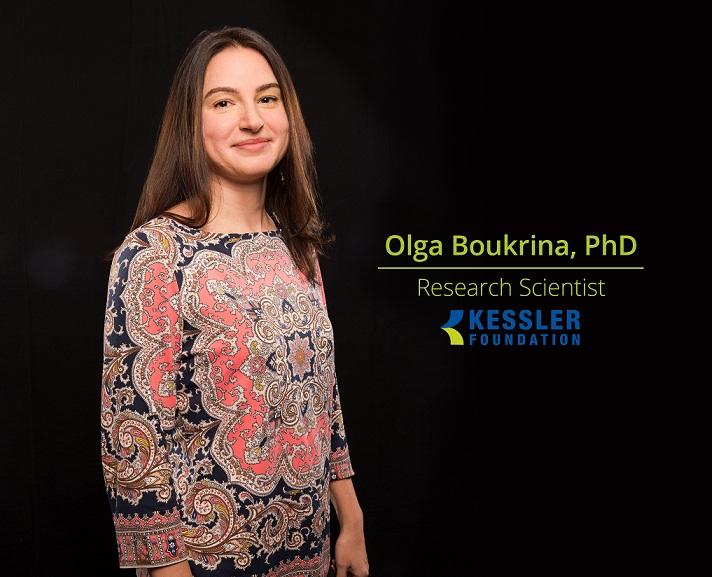
Credit: Kessler Foundation
Olga Boukrina, PhD, research scientist in Stroke Rehabilitation Research at Kessler Foundation, has received a two-year, R21 award from the Eunice Kennedy Shriver National Institute of Child Health and Human Development (NICHD) valued at $400,000. The grant funds a study exploring a potential neural mechanism that could explain recovery of impaired reading after stroke.
Reading deficits are common after stroke and represent a significant handicap, preventing individuals from returning to work, school, and the community. The goal of this project is to investigate the brain mechanisms that enable reading rehabilitation after stroke. Researchers will follow 34 left-hemisphere stroke survivors over the 2-year project period, measuring changes in brain blood flow and brain activation to predict reading recovery using neuroimaging.
"Using a novel neuroimaging technique called perfusion functional Magnetic Resonance Imaging, we will see if the re-appearance of reading-related brain activity in the left-hemisphere is associated with recovery," noted Dr. Boukrina. "The ability to predict recovery from neuroimaging has tremendous value in rehabilitation for generating prognoses. It may also dramatically improve the quality of research evaluation for novel, targeted interventions such as noninvasive brain stimulation or pharmacologic therapies."
Grant #1R21HD095488-01
###
Dr. Boukrina discusses her research on reading deficits in the stroke population in this Expert Interview podcast: https://soundcloud.com/kesslerfoundation/eis-olga-boukrina.
Relevant article:
Boukrina O, Barrett AM, Alexander EJ, Yao B, Graves WW. Neurally dissociable cognitive components of reading deficits in subacute stroke. Front Hum Neurosci. 2015; 9: 298. doi: 10.3389/fnhum.2015.00298
About Stroke Rehabilitation Research at Kessler Foundation
Research studies span all domains of post-stroke dysfunction, including cognitive deficits and mobility impairment. Under the direction of A.M. Barrett, MD, stroke scientists also mentor students, resident physicians, and post-doctoral trainees in translational neuroscience of rehabilitation. Cognitive research emphasizes hidden disabilities after stroke, including disabilities of functional vision (spatial bias and spatial neglect) and reading deficits. Mobility research, in partnership with Human Performance & Engineering Research, centers on the application of robotic exoskeletons for stroke rehabilitation. Stroke research receives funding from the National Institute on Disability Independent Living and Rehabilitation Research, Department of Defense; the National Institutes of Health/NICHD/NCMRR; New Jersey Commission on Brain Injury Research, Kessler Foundation; the Healthcare Foundation of New Jersey; and the Wallerstein Foundation for Geriatric Improvement. Scientists have faculty appointments at Rutgers New Jersey Medical School.
About Kessler Foundation
Kessler Foundation, a major nonprofit organization in the field of disability, is a global leader in rehabilitation research that seeks to improve cognition, mobility and long-term outcomes, including employment, for people with neurological disabilities caused by diseases and injuries of the brain and spinal cord. Kessler Foundation leads the nation in funding innovative programs that expand opportunities for employment for people with disabilities. For more information, visit KesslerFoundation.org.
Stay Connected
Twitter | http://www.twitter.com/KesslerFdn
Facebook | http://www.facebook.com/KesslerFoundation
YouTube | http://www.youtube.com/user/KesslerFoundation
Instagram | http://www.instagram.com/kesslerfdn
iTunes & SoundCloud | http://www.soundcloud.com/kesslerfoundation
Media Contact
Laura Viglione
[email protected]
973-323-3675
@KesslerFdn
http://www.KesslerFoundation.org
Original Source
https://kesslerfoundation.org/content/dr-boukrina-kessler-foundation-explores-intervention-reading-deficits-after-stroke





